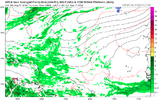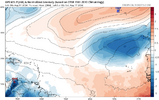Brent
Member
Gfs stalls and doesn't make landfall through Tuesday
This could be a bad situation not only a strengthening storm but a stall along the gulf coastGfs stalls and doesn't make landfall through Tuesday
And we know how these have blown up in the Gulf rapidly the past few years.This could be a bad situation not only a strengthening storm but a stall along the gulf coast
Texas needs to keep an eye , the westward trend just starting. Alabama can breath a sigh of relief hopefully
Let’s hope so, but think TX could be to far west for this stormTexas needs to keep an eye , the westward trend just starting. Alabama can breath a sigh of relief hopefully


For timing:need a center 1st
Crazy to think we might have no idea on a real track until like 24hrs before a potently landfall.For timing:
GFS - Saturday midnight
ICON - Saturday morning
EURO - Sunday early morning
yep....it always seems to be 3 days prior before even getting close to a clue.Crazy to think we might have no idea on a real track until like 24hrs before a potently landfall.
JB says Aug 2020 is on the table.
We have an invest page for this stormNow expected to be in NC?!!
You should like the Hurricane models.We have an invest page for this storm
